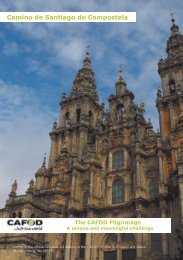Religious Education Curriculum Directory (3-19) - The Catholic ...
Religious Education Curriculum Directory (3-19) - The Catholic ...
Religious Education Curriculum Directory (3-19) - The Catholic ...
- No tags were found...
Create successful ePaper yourself
Turn your PDF publications into a flip-book with our unique Google optimized e-Paper software.
<strong>Religious</strong> <strong>Education</strong> <strong>Curriculum</strong> <strong>Directory</strong>Ca Recognition and acceptance of him as the Sonof God who died to save us from our sins (1248)b Willingness to believe and trust in what Jesushas taught us about the Triune God, aboutourselves, and about how to live (915, 1693,1816, 1823, <strong>19</strong>86, 2262, 2347, 2427, 2466, 2612)c Faith has practical implications for daily lifeand one’s relationship with Christ (908)d It involves active participation in the Churchcommunity and working to spread the faith byword and example<strong>The</strong> relationship between faith and religion (2084,2135)a Religion refers to a set of beliefs and practicesDfollowed by those committed to the serviceand worship of Godb Faith is different from religion<strong>The</strong> fullness of Revelation is reflected in the lifeand teaching of the <strong>Catholic</strong> Church (748-870)a <strong>The</strong> Church was founded by Jesus Christ (811-812)b <strong>The</strong> Church is the Body of Christ in the worldc <strong>The</strong> Church is a unity of one faith in one Lordthrough one Baptism (813-16)d <strong>The</strong> Magisterium guards and hands on thedeposit of faith and is entrusted with the authenticinterpretation of Revelation (880-896)1.2. THE SCRIPTURES<strong>The</strong> Scriptures reveal for our pupils the unfolding history of the covenant relationship and the varietyof human response. Both Old and New Testament Scriptures are presented as the living Wordof God, written through the guidance of the Holy Spirit. <strong>The</strong>re is the continued emphasis that Scripturehas been received and handed on through the generations as the Tradition and teaching of theChurch.1.2.1. Divine Inspiration (105-108)A Inspiration is the gift of the Holy Spirit by which ahuman author was able to write a biblical bookwhich has God as the author and which teachesfaithfully and without error the saving truth thatGod willed to be given to us for our salvation (105,135)B Since God inspired the biblical writers, he is theauthor of Scripture (105-106, 136)C Because the human authors needed to use the languageand thinking of their time, we need to studythe conditions and use of language in the contextof their time and understand what they intendedto communicate, remembering that these humanauthors might not have been conscious of thedeeper implications of what God wanted to communicate(106, 108-114)D <strong>The</strong> Bible is inerrant in matters of Revelation andfaith: because God is the author of Scripture, allthe religious truths that God intends to reveal concerningour salvation are true; this attribute iscalled ‘inerrancy’ (107)E <strong>The</strong> Bible is the name given to the Sacred Scripturesfor Christians; it contains in the Old Testamentwritings sacred to the Jews (cf. the ‘Jewish’or ‘Hebrew’ Bible)1.2.2. How the Bible came to be (120-130)A Oral tradition and its role (76, 126)B Development of the written books (76, 106)C Setting the canon of Scripture (120)a Apostolic Tradition is the basis for whichbooks the Church included (120, 138)b Sometimes other criteria came into play, e.g.the ‘Gnostic gospels’ were rejected in part becausethey did not include or shied away fromthe suffering and Death of Jesusc Local Councils of Hippo (AD 393) and Carthage(AD 397)d Ecumenical Council of Trent (AD 1545-1563)D Translations of Scripture1.2.3. Sacred Scripture in the life of the Church(131-133)A Importance of Sacred Scripture (131,133, 141)B Study of Sacred Scripture (132)C Scripture and prayera Liturgy of the Hours (1176-1177)b Scripture at Mass and other liturgies (103,1096, 1100, 1184, 1<strong>19</strong>0, 1349)c <strong>The</strong> Psalms and the Our Father are biblicalprayers shared by all Christians (2585ff, 2759ff)d <strong>The</strong> monastic tradition and Lectio Divina: ameditative, prayerful approach to Scripture14
















